The Story of Delej -- if it wasn't completely true, it would make for great fiction
Some say it's a story of reincarnation. Others say it's just a tragic love story with a redemptive ending. Jake Romm of the Jewish Forward says ".... it does not quite equal a resurrection, but it is as close as we could hope to come." (Read more: http://forward.com/culture/359197/after-the-holocaust-only-this-young-composers-music-survived/). I like to say it's a window into the nature of consciousness, but that isn't initially obvious. It will take much more time and posts to make that point, so we'll simply start with the story.
Lajos Delej (LUH-yosh DELL-ay) was a Hungarian Jewish concert pianist and composer who was a rising star in the classical music scene in pre-war Budapest. He was born on December 27, 1923 into a Hungarian family living in Berlin, but at age 10 his family moved to Budapest because of events portending trouble for Jews. During his years in Budapest, he studied privately with Sandor Veress (better known for teaching the now famous Hungarian 20th Century composer, György Ligeti), Pál Kadosa and György Farago, all well-known figures in the musical world of their time. He befriended Ligeti and the recently deceased famous cellist Janos Starker for whom he wrote a Sonata for Cello and Piano. He once performed one of his own solo piano pieces for the great German pianist Walter Gieseking who was so impressed with the piece (called "The Flame") that he decided to make it part of his own repertoire. Unfortunately, Lajos Delej died in the Buchenwald concentration camp at the age of 21, and almost all of his music was lost.
The only part of this information that I knew when I was a young boy was that Delej was a promising young concert pianist and composer. My introduction to him occurred when I was about eight years old. It was then that my father was placed in a nursing home because of a severe case of multiple sclerosis that made it too difficult for my mother to care for him at home any longer. There was a picture of Lajos Delej in our family album and, with my father in a nursing home, my mother was freer to speak about him.
I learned that Delej and my mother were essentially engaged. It wasn't official, but it was clear enough to both of them. They met at the home of my mother's paternal uncle Jeno (Eugene, in English) in the summer of 1941 (my best estimate now). Jeno had two daughters. One of them, Lucy, was a talented pianist and Jeno hosted a piano recital for her in his home. My mother was invited and so was Lajos Delej, perhaps because he was in the area at the time studying with Veress. Delej saw my mother seated in the audience and it was love at first sight for him. He approached my mother and told him he was interested in making more of an acquaintance with her. She was surprised and in some disbelief. He was a tall, handsome man who was treated like a dignitary wherever he went because of the glowing reviews in the newspaper about his piano concerts. Here's the picture of him that appeared in our family album: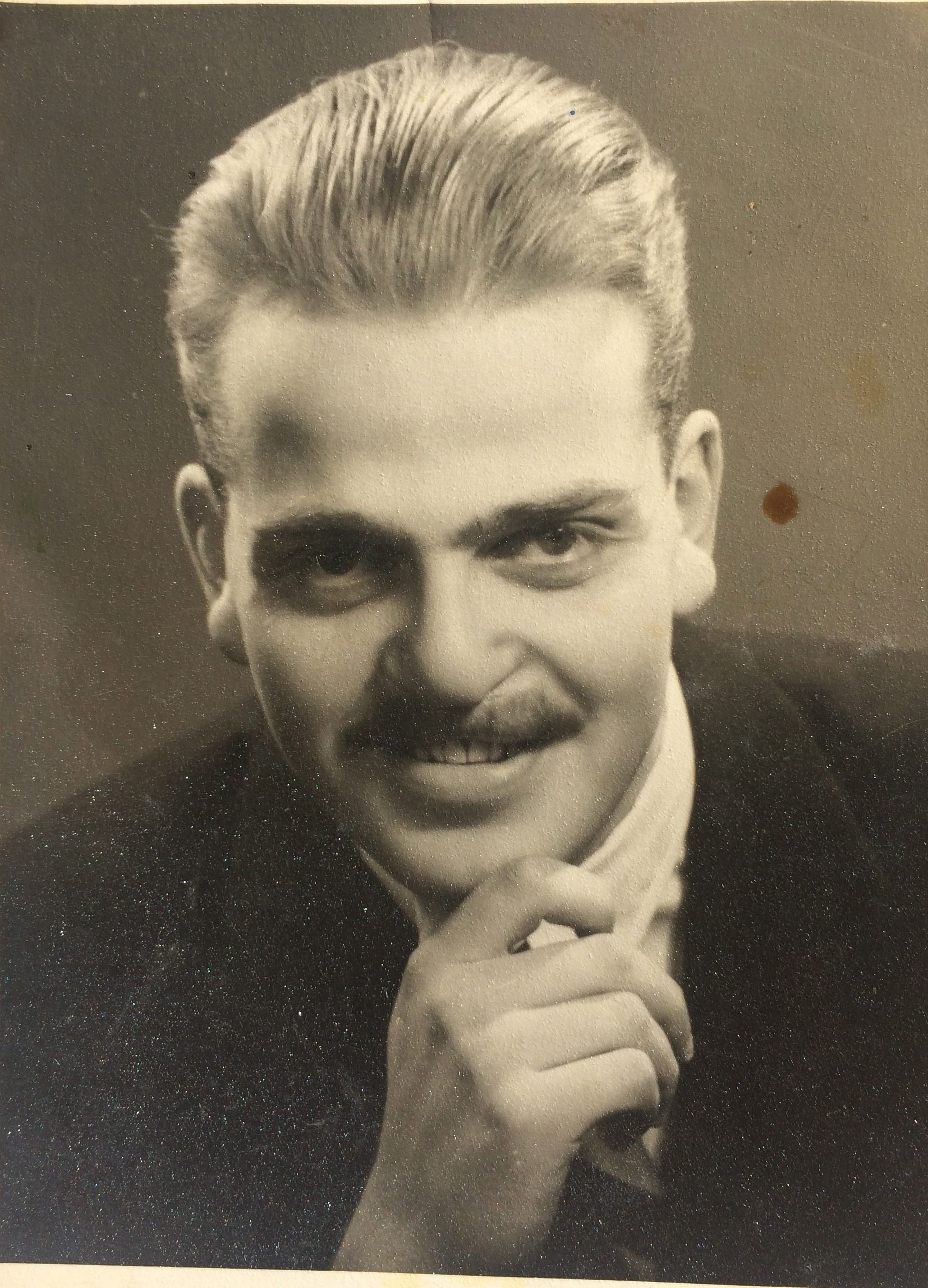
He made good on his word and visited my mother frequently in her home town of Nagybánya (also called Baia Mare in Romanian). Here's a picture from our family album of them walking together on the main concourse in downtown Nagybánya:

Their love grew. Delej was a nominally Jewish man raised in a wealthy secular home in Budapest. My mother was a pretty girl from a more observantly Jewish home in the less cosmopolitan countryside. They knew they were heading toward marriage, but somehow my grandfather (my mother's father) found out that Delej wasn't circumcised and told him in no uncertain terms that he wouldn't give his daughter into marriage with an uncircumcised man. Delej responded decisively and quickly that he would take care of that issue, and they were in agreement that they could continue to progress toward marriage.
Delej visited my mother frequently from his home in Budapest. He knew that his family was working to get him to the United States, and he asked my mother on several occasions if she would accompany him to the U.S. My mother was coy. She wasn't eager to move, and she didn't see what was coming the way his family did.
In April or May of 1944, Jews from my mother's hometown were rounded up into a ghetto to prepare for deportation to the concentration camps, though they didn't know what was awaiting them. Delej called one of the families living nearby my mother -- a family who had a telephone -- and learned that my mother and her family were taken to the ghetto. What happened next is unclear.
Jews in Budapest were relatively safe from Hitler's ambitions. Delej's family was given "schutzpasses", which would have given them protection to emigrate safely. Unfortunately, a right-wing Hungarian fascist group called the "Arrow Cross" rose up around October or November of 1944 and began doing to Jews in Budapest what the Nazis had been doing in other areas. Delej's mother hid from the Arrow Cross, but apparently Delej did not. According to Iren (Irene, in English), the housekeeper, Lajos Delej chose not to hide but instead made himself available to be picked up by German authorities. Iren said that he hoped in this way to be reunited with my mother, whose fate he did not know except that she had been taken into the ghetto near her hometown.
Delej ended up in the Buchenwald concentration camp and died of sepsis due to an infected frostbite wound on his left foot. He died on February 17, 1945, just two months before the camp was liberated.
My mother didn't know how he died. All she knew was that when she returned to her home after surviving Auschwitz and the Death March, she sent a letter to his home hoping to reunite with him. She received back a letter from his mother telling her that he had died.
About two years later, my mother met my father. They were married in 1948 and moved to Paris where they lived for six years before emigrating to the United States. In Paris, my father began showing signs of the illness that would end up leaving him totally and permanently disabled. By the time I was born in 1959, my father was unable to work. My mother had very little education and spoke almost no English. She found herself in a sweat shop behind a sewing machine and learned enough to make that her trade.
Growing up an only child with a disabled father and a mother working hard to eke out a living, and with the stories of the Holocaust in the background, there was a pervasive sadness in our home, but my mother countered that by nursing her deep abiding faith in a personal God. She believed God always cared for her through all the travails of her life, and she taught me to nurse that same optimism and faith. Though I don't think I consciously picked up on her fear, I believe she was worried about what kind of role model was I getting in a father who was so ill. Stories she told me about Lajos Delej conveyed her ideas about what attributes a man should have. Perhaps it isn't a surprise that, at age nine, I responded to my mother's question about what instrument I wanted to learn by stating I wanted to play the piano. Here I am in those early years:
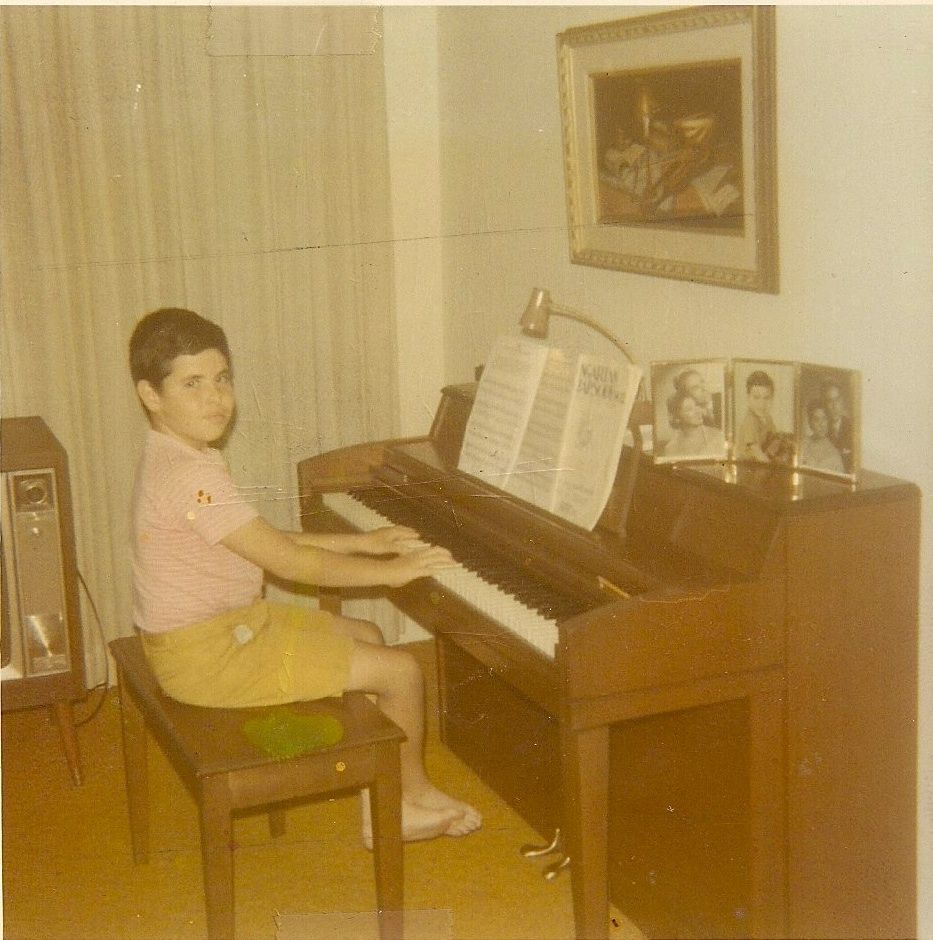
Choosing to learn the piano was useful as a way to entertain my father. I visited him once a week in the nursing home and occasionally with my mother on the weekends, and it was a good way to pass the time. Here is a picture of us together at the nursing home:
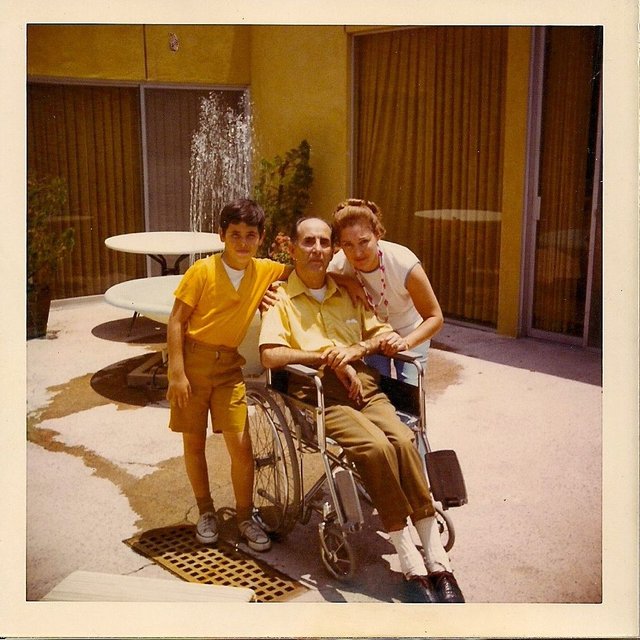
I got good at playing the piano. My mother began harboring thoughts that I was Delej reincarnated (she believed in that kind of thing). She now says that she always regarded me as "Delej's son". Naturally, I was curious about this man who I had unconsciously modeled myself to become, and I looked up information about him in every possible place. Unfortunately, I had been spelling his name incorrectly. When asked, my mother told me that his name was spelled "Deley". The problem is that she didn't know the English alphabet very well and it was easy for her to mistake a "j" for a "y". When the internet first became available, I started my searching all over again, but to no avail.
Finally, in October 2015, my fiancee, Bev, suggested that we visit the U.S. Holocaust Museum in Washington, DC to search for him there. I wasn't expecting anything after my many years of searching, and I didn't think they would have records of his death because my mother told me she understood he died in the Budapest ghetto, and I thought there would be no record of that. With the help of a skilled staff member, Bill Connelly, we were able to locate his records.
It was there that we learned he had died in the Buchenwald concentration camp from sepsis. We also found in their archives a letter written by his mother to the International Tracing Service hoping to locate his remains, and that letter was written from an address in New York City. Armed with that address and my Ancestry.com account, I began building a Delej family tree and discovered that he has living relatives in New York, specifically a nephew (only son of his older sister who moved from Budapest to New York prior to the war) and his nephew's three children.
I reached out to his nephew and received a response from one of his nephew's daughters. Through her, I began to learn more details about Delej's musical life. Having studied classical music as much as I had allowed me to be the perfect recipient of the information they shared with me.
I learned that Delej had written a Sonata for Cello and Piano for his close friend Janos Starker and that, just two years ago, Warner studios released a recording of Starker performing the Scherzo movement from that Cello Sonata. Starker frequently played the Scherzo as an encore piece and he recorded it back in 1958 (with Gerald Moore as the accompanist) for an album of encore pieces. It wasn't chosen for the final album and stayed locked in the Warner archives until after Starker's death. It was released no more than a year before our trip to the Holocaust museum. It can be found on the 5th track of the 10th CD of this compendium:
![Starker - The Warner Legacy.jpg]
(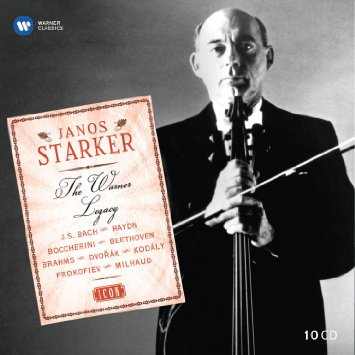 )
)
They also gave me a concert program of a concert that took place in June 1942 in which the entire Cello Sonata was performed as well as other music, all written by Lajos Delej.:
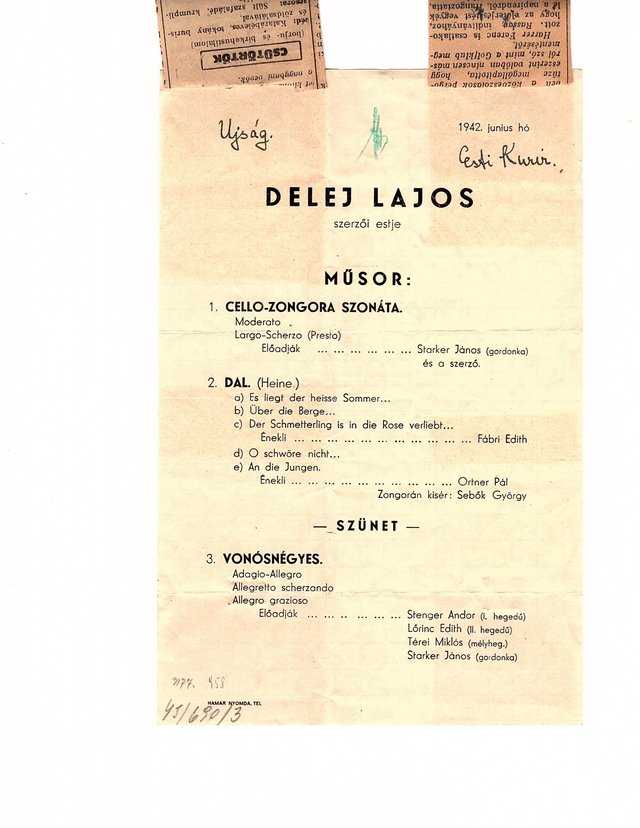
Of note, the piano accompanist for the cello sonata was Delej himself and the accompanist for the songs (Dal) in the first half of the program was György Sebok, who became a famous pianist and pedagogue and joined Janos Starker in the music department of Indiana University. The famous living concert pianist Jeremy Denk studied with Sebok and wrote movingly about his relationship with him in this article from April 2013 edition of the New Yorker magazine:
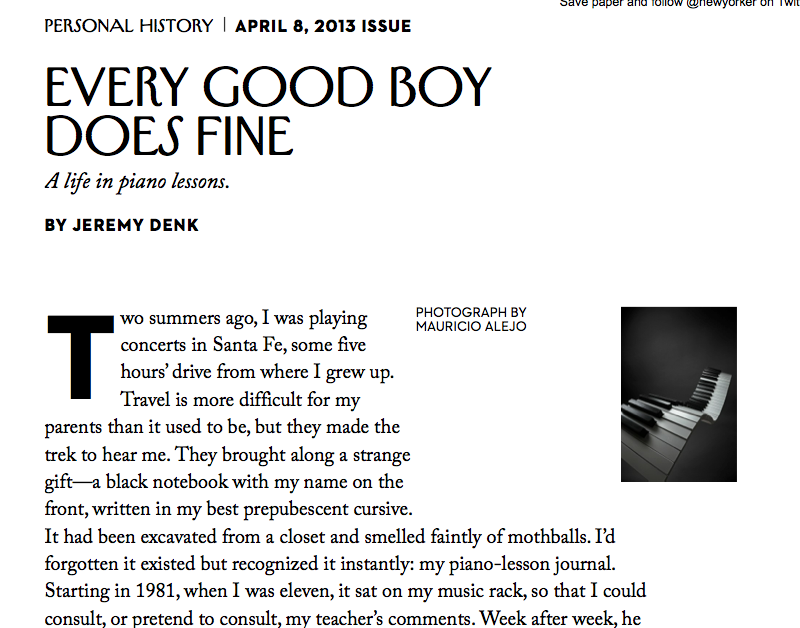
I also learned that the family had some solo piano sheet music that Delej had composed when he was 15 years old. It had never been performed. The family gave me a copy of the sheet music. Naturally, I set it as a goal that I would perform the world premiere of this piano music, and that opportunity came to be on May 4, 2016 in the end-of-semester recital for my Piano Interpretation and Performance seminar at the Continuing Education program of the New England Conservatory. That performance can be seen here:
Just a couple of days after this performance I sent in my application to be a contestant in the inaugural San Diego International Piano Competition for Outstanding Amateurs. I had competed twice before in amateur piano competitions, both in Boston back in 2001 and 2003 and had never made it to the final round. This time, I built my experience at the competition around the Story of Delej and placed his three pieces in my program by putting them in the final round hoping that I would be able to perform them there. Here is my entry from the official program for the competition:

The entire official program from the competition can be seen here: http://amateurpianists.org/wp-content/uploads/2016/07/AmateurPianists-Competition-Program-1.pdf
As fate would have it, I progressed through the rounds of the competition and made it to the final round. Once again, I had a chance to perform Delej's pieces, though this time, Delej's sweetheart, my soon-to-be-94-year-old mother, was seated in the audience. We had planned to be in San Diego for that weekend anyway in order to celebrate my mother's birthday with her when we learned that the competition was scheduled for that weekend. She is too reluctant these days to travel, so the opportunity for her to hear music written by her most beloved Delej was arranged for her by lucky circumstances. Here's what she heard that day, just two days before her 94th birthday:
To my great surprise and joy, I was awarded First Prize! 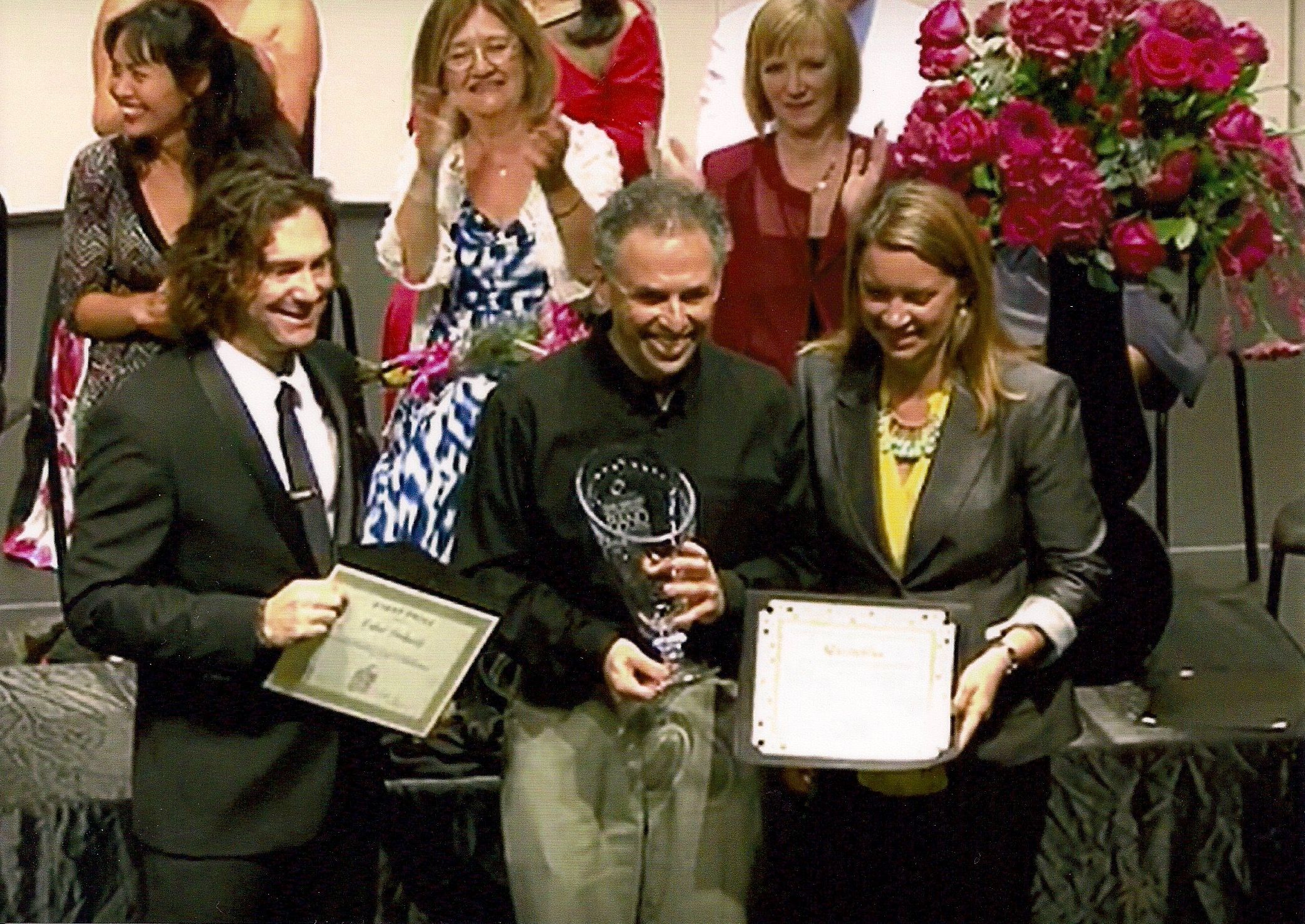
The story was picked up by a local internet-based magazine: https://www.eastcountymagazine.org/son-san-carlos-resident-wins-amateur-pianists-san-diego-international-piano-competition
Once I returned home, I recognized that the story had great potential because of its edifying ending and I pitched it to the Boston Globe. I wrote the following email to the chief editor of the Boston Globe, Brian McGrory:
Dear Mr. McGrory,
I was speaking with some colleagues at the cafeteria of Metrowest Medical Center in Natick, where I have my office, and they encouraged me to contact someone at the Globe about a developing human interest story.
I am a psychiatrist in private practice who works and lives in Natick, and I just returned from San Diego California where I took first prize in an amateur piano competition. During the final round of the competition, I played music by a little-known composer named Louis Delej (pronounced DELL-ay) who is of special personal interest to me because he and my mother were engaged before they were both carted off to concentration camp. My mother was placed in Auschwitz and survived (she is 94 years old now) and Delej died at age 21 in Buchenwald. I grew up hearing stories about him, and they significantly influenced me to study the piano. Through a remarkable sequence of events beginning just last October, I was able to locate living relatives of his in the United States and have developed a rich email correspondence. One of them sent me the sheet music that I performed during the final round of the competition.
His notoriety has been increasing over the last couple of years. A recent 10-CD compendium of recordings by the late great cellist Janos Starker included a piece that Delej wrote. It turns out Delej and Starker were close friends back in Budapest.
An article in an online magazine discusses some of the details about the competition: http://www.eastcountymagazine.org/node/21992
Please let me know if there might be any interest in this story, and to whom I might turn to discuss it further.
Thank you,
Robert Berkowitz, MD
This was Mr. McGrory's response:
Dear Dr. Berkowitz,
Thanks for reaching out with such a delightful story tip, and many congratulations on your win in San Diego. I've flagged our arts editor, hopeful that her interest is as high as mine. I'm assuming someone will reach out to you shortly.
All best,
Brian McGrory
Soon thereafter, I was contacted by Malcolm Gay of the Boston Globe who met with me sometime in August 2016 to discuss the story. He too was impressed. He started doing research on the story and spent much time on it. In October, he and his videographer colleague, Scott LaPierre, came to our home to make a video to go along with that developing newspaper article. He was about ready to publish it around that time, but another serendipitous development occurred. Out of nowhere, a professor from Hungary's Central European University made contact with Delej's nephew looking for correspondences that had been written by Delej's father. It turns out the family had many letter written from Lajos Delej's father, Imre Delej, to his daughter, Delej's older sister who had moved to the U.S. The researcher, Professor Michael Miller, a historian, was looking for information about a man who was a close friend of Imre Delej as a window into understanding the lives of Hungarian Jews living in Germany. He read the many letters with interest, and his pursuit of that information coincided with Malcolm Gay's writing of the article about Lajos Delej. Miller read through over a hundred letters and filled out more of our information about Lajos Delej through what was recorded in those letters.
The Boston Globe article finally appeared. It appeared on the front page of the January 8, 2017 Sunday edition. In the paper edition, it was called "Notes from the End of Time". Here is a picture of the front page: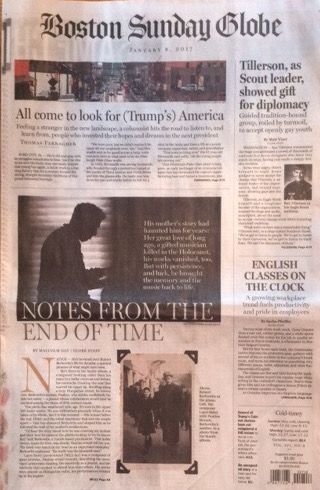
and here is its continuation in the middle of the A section: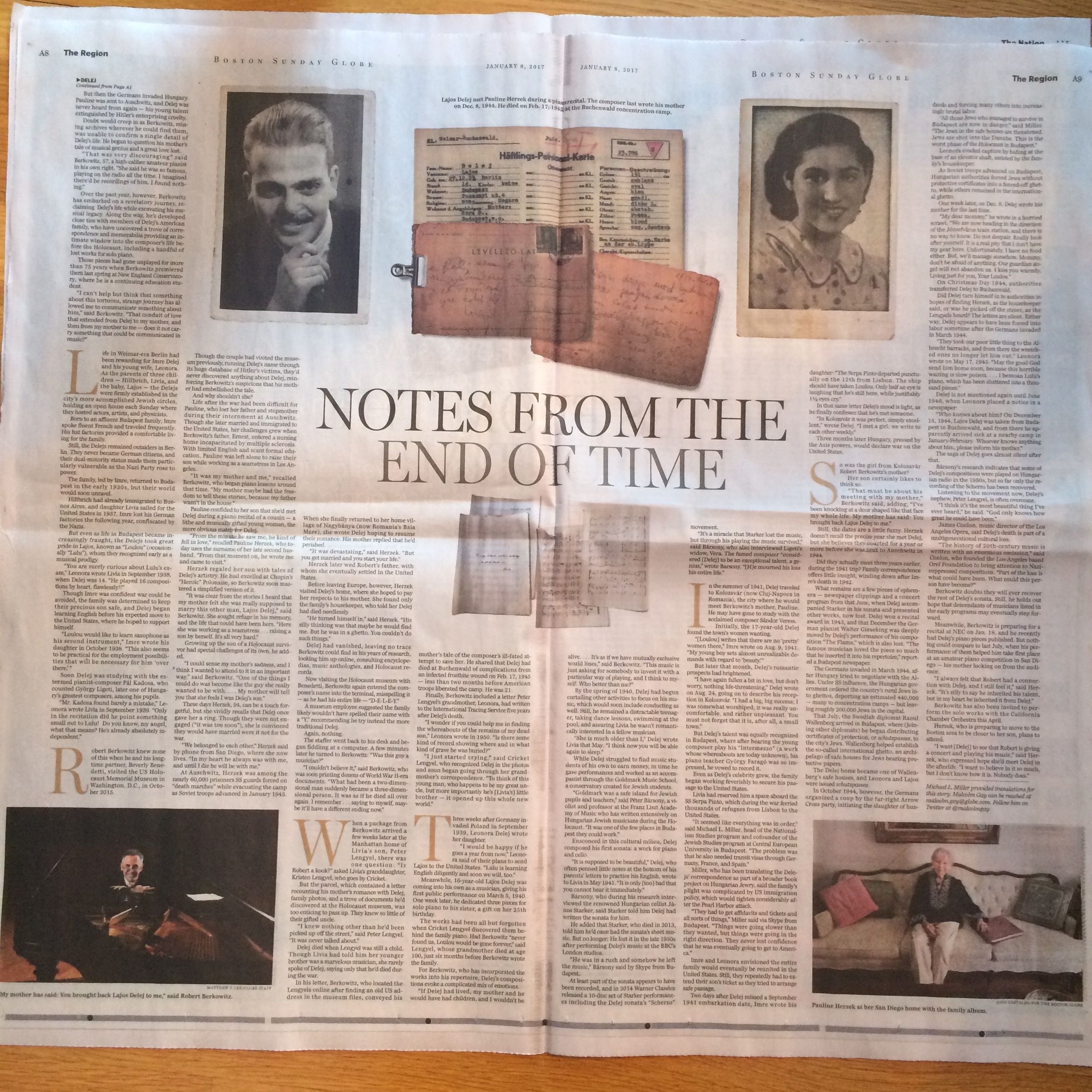
The article can be read here: http://www.bostonglobe.com/arts/music/2017/01/05/she-loved-him-and-died-holocaust-now-her-son-bringing-his-music-back-life/M4yW8pio3QwC9bnh1AhKaN/story.html
The associated video can be seen here:
http://ayottemusic.blogspot.com
As a result of having won the competition, I was given the opportunity to perform a movement of a concerto with the California Chamber Orchestra on a prearranged concert date of April 29, 2017. As it turned out, that date was perfectly positioned to take advantage of my upcoming semester in the class at the New England Conservatory. Though I was reluctant to get back into a mode of practicing piano, the orchestra conductor, Dana Zimbric (who can be seen standing on my left in the photo in which I receive the first prize trophy), indicated an interest in using the concert as an opportunity to further the story about Lajos Delej. I accepted her offer.
Also as a result of winning the competition, I was invited to perform at the 16th annual Winners Gran Prix recital of the Washington International Piano Arts Council (WIPAC). The Winners Gran Prix recital invites all the year's winners of amateur piano competitions to perform as a fundraising event for their organization. I thought about going, but wasn't so excited knowing that I would wish to include Delej's Three Piano Miniatures (as we now call them). The event almost always takes place at the Austrian Embassy, and it would have been difficult to deliver a story there about a Hungarian victim of the Holocaust. Strangely, before I accepted the invitation to perform there, the venue was changed abruptly to the home of the Romanian ambassador. It was much easier to tell the story there, since the courtship between my mother and Lajos Delej occurred in Romania. Here is my performance of the Delej pieces at the home of the Romanian ambassador on April 20, 2017:
A week later, I arrive in Temecula, California for my performance with the California Chamber Orchestra. Though by this time we had moved my mother from San Diego to be closer to us near Boston, we took her out with us so she could enjoy bearing witness to how her son was bringing her sweetheart's name and music back to life.
Here is the performance of the first movement of the Concerto for Piano and Strings by Felix Mendelssohn:
Right afterward, the concert programmed a performance of Delej's Three Piano Miniatures, and they began by playing the Boston Globe video on the big screen. Imagine what my mother must have experienced to see herself and those pictures from our family album appear on the big screen, and then to have her son play the music written by the man she was supposed to marry. It can be seen here (if you don't want to see the Boston Globe video, my performance begins at about 5'20") :
Back in March 2016, in my eagerness to be the first to perform Delej's pieces, I published this YouTube video:
In the description of that video, I wrote the following:
I have been struck by the link between my life and Delej's death. It is understood that if Delej had survived Buchenwald, he and my mother would have married and I would never have been born. I am here only because he is not, and that draws me to tentatively suggest the following idea: If there is such a thing as a soul, mine is somehow connected to his. My mother expressed as much when my growing interest in piano as a child prompted secret thoughts in her that I might be Delej reincarnated.
I don't believe that I am reincarnated from Delej, but I wonder what to make of that soul connection. He loved my mother intensely. She was the recipient of that love and turned around later in life to give from her love to me. What exactly gets conveyed through a conduit of love linking two mutually exclusive world lines? These little piano pieces afford an opportunity to consider this question.
The piano pieces were a birthday gift from Lajos to his sister on the occasion of her 25th birthday. It is very surprising that they are written without titles, tempo markings or dynamic markings. They are like a coloring book needing to be colored. My hope in recording them without the benefit of hearing anyone else play them is that I get to demonstrate the very specific and personal way I color them, with the understanding that the way I have come to hear them is informed at least in part by the unique relationship I have to Lajos Delej through my mother.
If you're interested in reading more about this story, I have published a more detailed account of this story in a folio that also includes the manuscript for the music and an engraved copy of the music for easy reading. A hard copy can be found here on Amazon: https://www.amazon.com/Three-Piano-Miniatures-Lajos-Delej/dp/1541184750/ref=sr_1_1?ie=UTF8&qid=1501448078&sr=8-1&keywords=Delej
It is also available for digital download here: http://www.sheetmusicplus.com/title/three-piano-miniatures-digital-sheet-music/20389571
Thank you for your interest in this story. Please leave a comment.
Sincerely,
Robert L. Berkowitz, MD
"PianoPsych"
Congratulations @pianopsych! You have completed some achievement on Steemit and have been rewarded with new badge(s) :
Click on any badge to view your own Board of Honor on SteemitBoard.
For more information about SteemitBoard, click here
If you no longer want to receive notifications, reply to this comment with the word
STOP